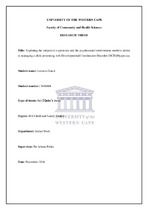| dc.contributor.advisor | Pedro, Athena | |
| dc.contributor.author | Ganci, Lorenza | |
| dc.date.accessioned | 2018-08-02T10:42:21Z | |
| dc.date.available | 2018-08-31T22:10:06Z | |
| dc.date.issued | 2016 | |
| dc.identifier.uri | http://hdl.handle.net/11394/6174 | |
| dc.description | Magister Artium - MA (Child and Family Studies) | |
| dc.description.abstract | Developmental Coordination Disorder, often also referred to as Dyspraxia, can
be described as a marked impairment in the development of motor coordination affecting daily
activities, in the absence of neurological or intellectual dysfunction. Developmental
Coordination Disorder is prevalent among 5 to 6% of the population of 5 to 11-year-old
children. Primary studies report on psychosocial interventions for children presenting with
DCD/Dyspraxia, however there is limited research available.
The current study consisted of two phases: a systematic review (Phase 1) and a qualitative
research study (Phase 2). The aim of the review was to systematically review previous research
regarding psychosocial intervention strategies utilised with children presenting with Dyspraxia.
This information was used to inform our understanding for the qualitative study (Phase 2) in
terms of how parents manage this disorder in the home environment. The aim of this qualitative
research study was to explore the subjective experience of mothers who have children
presenting with Developmental Coordination Disorder/Dyspraxia and the psychosocial
interventions they use to manage the disorder in their home. | |
| dc.language.iso | en | |
| dc.publisher | University of the Western Cape | |
| dc.title | Exploring the subjective experience and the psychosocial interventions mothers utilise
in managing a child presenting with Developmental Coordination Disorder (DCD)/Dyspraxia. | |
| dc.rights.holder | University of the Western Cape | |

